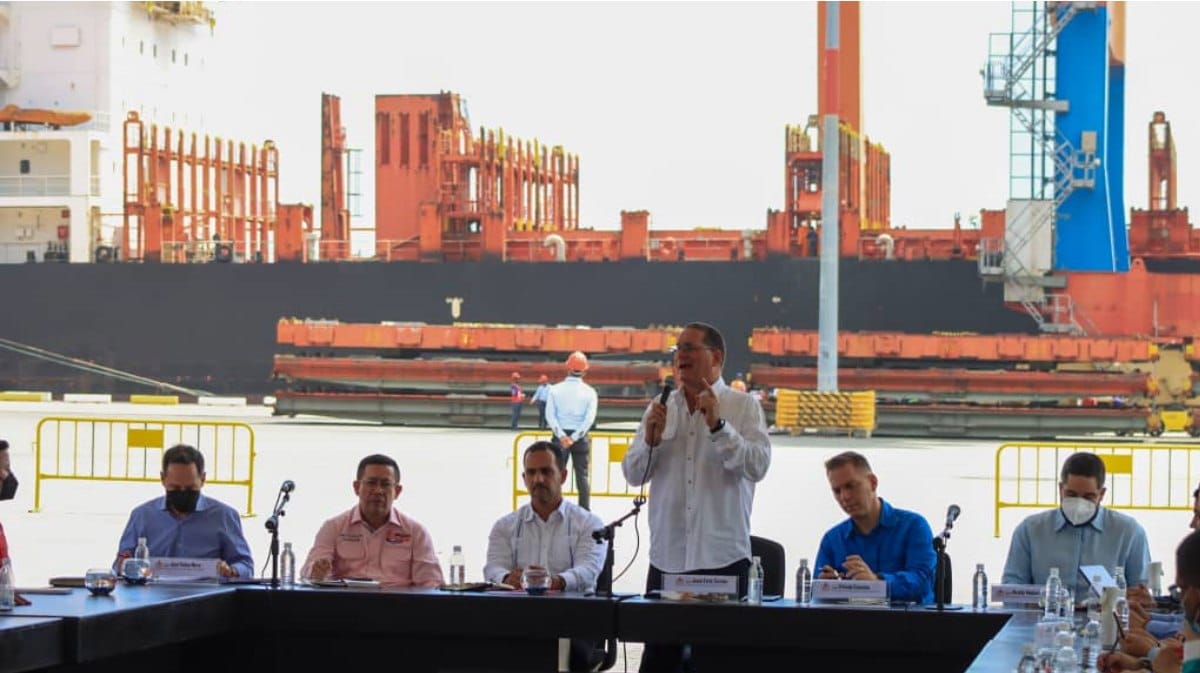
PSUV Deputy Jesus Faria speaking during a meeting with La Guaira authorities to discuss the SEZs. Photo: Ultimas Noticias.

Orinoco Tribune – News and opinion pieces about Venezuela and beyond
From Venezuela and made by Venezuelan Chavistas

PSUV Deputy Jesus Faria speaking during a meeting with La Guaira authorities to discuss the SEZs. Photo: Ultimas Noticias.
Three industrial zones for La Guaira, to be developed within the framework of the Law of Special Economic Zones (SEZs), were proposed by regional government authorities during a special session of the National Assembly’s Economic Commission held in the port of La Guaira.
The proposal focuses on an agricultural axis to develop the Carayaca and El Junko parishes, a tourist hub with a view to recovering the Sheraton and Meliá hotels, as well as Los Cocos beach in the Caraballeda parish, and a technological complex in the former Caracas warehouse of Urimare parish, as part of the Development Master Plan for the coast of La Guaira.
“We are called to build a development strategy for the country,” said PSUV deputy Jesús Farías, president of the Economy Commission of Venezuela’s National Assembly. “The special economic zone is an opportunity to collectively build the new economic model. We are in the phase of promoting the law and debate of ideas for the formation of each development area in the five zones of the country.”
The special meeting was attended by the president of the Commission for Economy, Finance, and National Development of the National Assembly, Jesús Faría, alongside parliamentarians José Gregorio Vielma Mora and Orlando Camacho, the governor of La Guaira, José Alejandro Terán, and representatives of the liquor, hotel, gastronomy, customs, and export chambers of commerce, among others.
RELATED CONTENT: Venezuela’s Special Economic Zones Law: What It Is & What It Is Not
They addressed issues such as tax procedures, customs duties and incentives, and others. “We will raise a proposal or decree of incentive plans for investment in light industries, territorial delimitation over areas of food, technology, transportation, cryptoactive mining, among others,” said the governor of La Guaira, Alejandro Terán.
Terán also proposed the development of a special district withing La Guaira, to include the port of La Guaira and the Simón Bolívar International Airport in Maiquetía, in order to establish productive links and to reduce logistics or transfer processes in the production of raw material and its export.
The objective is to attract national capital to invest in La Guaira and the country, as well as to start the installation of light industries, which would generate jobs and commercial activities for internal consumption.
“We seek to develop the gross domestic product, the growth and well being of the population, of the working class,”said deputy Vielma Mora. “The call is to the private industry to join [these] efforts, since we carried out a study in 14 countries that develop this experience, and we have all the advice, technology, science, and innovation in the economic area.”
RELATED CONTENT: Special Economic Zones: Why Venezuela Relies on Them to Attract Foreign Investment
Industrialists of La Guaira
The regional executive proposed the establishment of productive links or production chains in La Guaira, with a view to boosting exports, and reinvigorating port activity as a competitive advantage for the development of the special economic zone.
They plan to develop a technology and industrial services park, a tax incentive plan, and various projects and land for the development of other industrial activities.
The goal “is to transform the old Almacenadora Caracas into a modular condominium for light industries,” said Terán. “It is located 12 minutes from the port and 5 minutes from the airport… They would be for the production of telecommunications, technology, and other supplies for the hotel industry.”
He proposed a specific agenda of actions, based on the promotion of the SEZ Law and projects, such as the manufacture of equipment for cabotage transport, oxygen production, medical equipment, and fertilizer.
(Últimas Noticias) by Luis Ortega
Translation: Orinoco Tribune
OT/JRE/SL